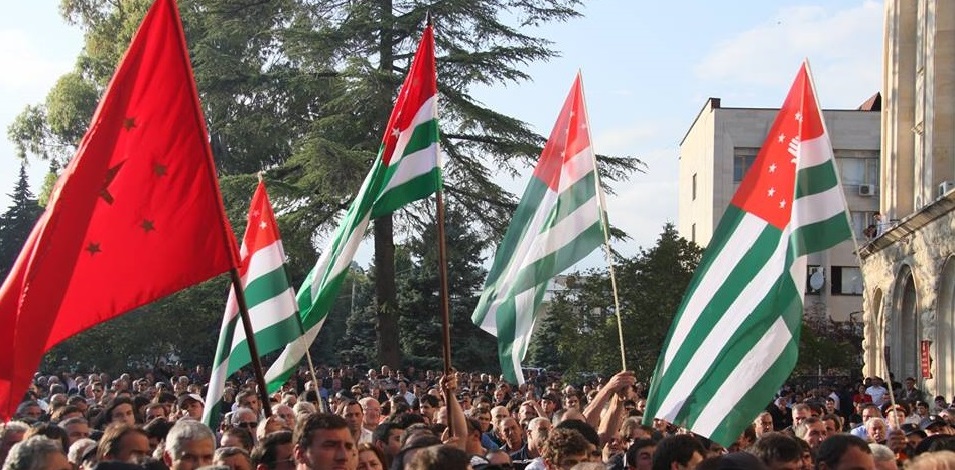Some thoughts on the crisis in Abkhazia, by Oliver Urs Lenz

Taklama -- On the 27th, opposition protesters led by Raul Khajimba rallied in the centre of Sukhum, demanding major government change. After several rounds of unsuccessful talks with government representatives, protesters stormed the Presidential Administration, causing President Alexander Ankvab to flee to Gudauta. Since then, Vladimir Putin’s aide Vladislav Surkov has flown in from Russia to help find a way out of the resulting stand-off. In the most recent development, Parliament tonight passed a motion of no-confidence in Prime Minister Leonid Lakerbaia and called upon President Ankvab to resign.
- Besides decrying government corruption and inaptitude, the opposition has two major grievances: that the government has failed to use massive amounts of Russian aid to develop Abkhazia’s economy, leaving it in a very dependent position, and that it has been issuing passports to Georgians much too liberally, undermining Abkhazian statehood.
- This is the biggest political crisis in Abkhazia since the Tangerine Revolution in 2004. At the time, Khajimba was the outgoing Prime Minister and first President Vladislav Ardzinba’s anointed successor, but he lost to opposition leader Sergei Bagapsh, which after months of protests he was forced to concede. Ankvab’s support played a crucial role in Bagapsh’s victory and he succeeded him after his death in 2011.
- Already during Ardzinba’s Presidency, there were large-scale protests, which played a role in his high government turn-over, and even calls for Ardzinba’s impeachment. That is to say, the current government is not necessarily excessively unpopular. But that the Presidential Administration was now stormed so relatively frivolously indicates the lack of respect enjoyed by Ankvab personally, who has always been a divisive figure.
- The taking of the Presidential Administration echoes its occupation by supporters of Bagapsh (and Ankvab) during the 2004 Tangerine Revolution.
- In 2004, Khajimba disputed Bagapsh’s victory on the grounds that votes cast by Georgian residents of the eastern districts were invalid as these were not Abkhazian citizens. While this was clearly a very opportunistic claim (as his own government had organised the election), the point had some merit, and holding an Abkhazian passport has since become a precondition for voting. The current Khajimba-led opposition now claims that the government has been issuing passports to Georgians to once again extent its voter base. It has demanded the firing of the officials responsible, including the governors of the eastern districts.
- It was initially reported that Ankvab had agreed to dismiss the government, and later also the Prosecutor-General and two district governors. Ankvab has now denied this. Likely he is prepared to concede this point, and Prime Minister Leonid Lakerbaia has expressed his willingness to resign to alleviate the crisis. But the opposition now demands Ankvab’s own resignation.
- The protest has prompted government supporters to rally in turn. It appears the opposition supporters are more numerous.
- It is unclear what policy vis-à-vis Russia the opposition would pursue. While it decries the fact that the government’s policy has left Abkhazia so dependent on Russia, given that Khajimba enjoyed Russia’s support during the 2004 Tangerine Revolution, closer integration with Russia cannot be excluded. Moreover, the opposition consists of many different groups, and much depends on who would actually obtain power.
- Since 2008, Abkhazia’s entry into the Russian Federation had been off the table. Russia’s annexation of Crimea means that from Russia’s perspective, this is no longer impossible. The greatest existential danger for Abkhazia is that the current crisis could enable Russia to force through this option. However, this is probably not what Russia wants, since it has no real reason to be unhappy with the current arrangement, and such a move would destroy its attempts to mend relations with Georgia (on its own terms) and further antagonise other countries.
- The government includes a number of fresh faces whose appointment was welcomed at the time. The opposition has acknowledged this by proposing that one-third of its government would consist of incumbents who are performing well, as its goal is a government for the good of Abkhazia, not purely to bring the opposition into power.
- Opposition protesters have also entered the offices of Abkhazia’s national broadcaster, whose employees now complain that they cannot report objectively in such circumstances. Intriguingly, Ankvab gave an interview to Abaza TV, owned by Beslan Butba, one of the opposition leaders.
- So far, the crisis has been relatively peaceful (the government has not used force against protesters), in keeping with Abkhazia’s political culture.
Source: Taklama